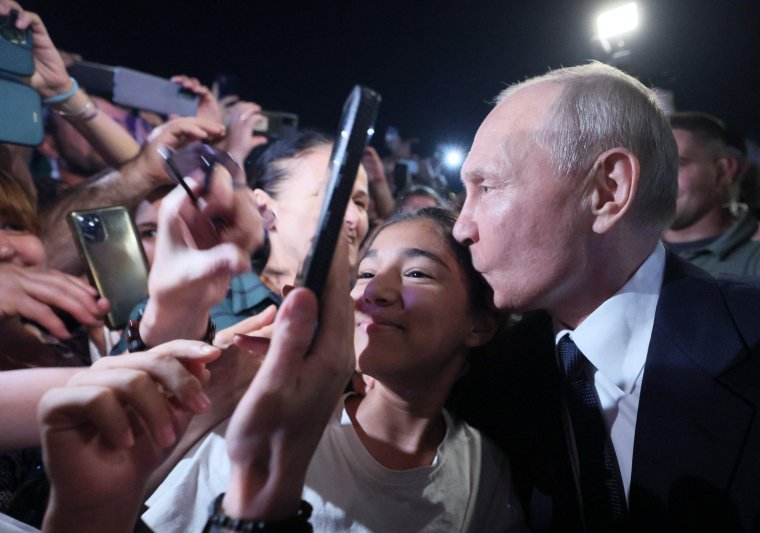The strange tale of Russia’s Wagner mutiny, and the uncertain fate of its leader Yevgeny Prigozhin, took another twist on Thursday amid reports that Vladimir Putin’s former cook and butcher-for-hire is not in Belarus in the safe care of lumbering despot Lukashenko, but in St Petersburg, no doubt paying great attention to the health of his underwear testers and the proximity of sixth-floor windows.
The Wagner boss’s life insurance premiums will not have been helped by fiercely critical reports of him on Russian state television on Wednesday, that suggested an investigation of the mutiny was still being pursued.

But bigger questions remain over the state and likely fate of the man who made Prigozhin what he is – and Ukraine into a partial charnel house.
As Putin’s war plans, and national and international standing, continue to be revealed, the dead-eyed dictator is torn between his natural instinct to hide, and his desire to shore-up his grip on power with grand-standing public appearances.
Predictions of Putin’s demise after that dramatic, but short-lived mutiny by Prigozhin may have proved premature, however.
Putin is protected by the clever power structure he has created for subordinates, which encourages different factions and individuals to compete with or undermine each other.
But the nature of the latest blow to Putin – a self-inflicted wound, given his patronage of the vicious mercenary group – accentuates the humiliation he has suffered.
Some pundits, including Stephen Hadley of the Atlantic Council and a former US National Security Adviser, think that Putin still has everything to play for. “Where this goes, depends a little bit on whether Putin regains his footing, is able to do a crackdown and a purge for those that were disloyal, and is able to restore the sort of balancing act that he was doing before,” he says.
Military intelligence specialist Chels Michta at the Centre for European Policy Analysis says that if Putin recovers control, he could use Prigozhin’s attempted mutiny to consolidate his power and shift to complete national mobilisation, setting the stage for a new phase of Russia’s war.
But sending tens or even hundreds of thousands more Russians to their deaths in eastern Ukraine could weaken his political position even further.
Konstantin Sonin, a Russian economics professor at the University of Chicago, thinks the likely collusion of key officials in Prigozhin’s rebellion will have horrified Putin. Sonin noted that army units stationed in the Rostov region put up no resistance as Wagner seized not only Rostov-on-Don, a city of more than a million people, but also the headquarters of the Southern Military District – the key command centre for troops fighting in Russia’s war with Ukraine.

“The Federal Security Service, which has a sizeable presence in the Rostov region, disappeared without a trace during Prigozhin’s mutiny. “Not only that, the Federal Security Service appears to have missed Prigozhin’s conspiracy completely. Perhaps it even took part in it,” he told Novaya Gazeta Europe.
He noted that for several hours after his morning address to the nation, there was not a word of support from other Russian politicians. Key figures such as Moscow Mayor Sergey Sobyanin, Russian Prime Minister Mikhail Mishustin, and Foreign Minister Sergei Lavrov all hid conspicuously from the cameras.
A pro-Kremlin online outlet has reported that the Moscow Oblast police will train in urban combat tactics, machine gun use, and grenade throwing to improve skills in the aftermath of Wagner’s armed rebellion. This is the sign of a regime confident in its popularity or stability. The Kremlin is clearly attempting to improve the ability of loyal security forces in Moscow to defend the regime against potential future threats.
Not surprisingly, it appears that Putin fled Moscow during the Wagner rebellion, probably to his residence in lakeside Valdai, between Russia’s Tver and Novgorod regions, 250 miles away.

Independent Russian-language news network Current Time, citing Flightradar24 data, said that Putin’s presidential jet, an Ilyushin Il-96, took off from Moscow as Prigozhin’s rebellion was under way. It reported that the aircraft’s transponder was turned off as it began to descend in the Tver region, suggesting the aircraft was heading to the Borisovsky Khotilovo air base – the nearest airfield to Putin’s Valdai residence.
But to repair the PR damage and boost his standing with the Russian population, Putin has been advised to increase his number of public appearances, according to independent media outlet Meduza.
Polls suggest that the Russian public’s trust in their leader has fallen since the Wagner mutiny. A source close to the Kremlin told Meduza: “The president will have more contacts with the people, he will appear more often.”
But in a land where impartial polling is hard to find, it’s hard to know how much the cowed and/or brainwashed proletariat will buy it.
This smiling, handshaking version of the Putin (with heavily vetted crowds at his disposal), appears at odds with the scheming and paranoid dictator who – left to stew in his Kremlin bunker during the Covid pandemic and isolated from good advice – had too much time to pore over historical texts in the archives that chimed with his prejudices and inclinations, that Ukraine is a renegade province of Russia.
His desire to hide away from sight and harm – behind Kremlin walls, at one of his fortified dachas or on the move in his armoured luxury train, like a peripatetic Bond villain – will only have been increased, however, by the Wagner mutiny and a series of attacks on Moscow by shadowy forces linked to Ukraine.
For now, little has changed in the immediate power structure of Russia. But all its dysfunction and potential to implode under the grievance and corruption orchestrated by one man have never been greater.


